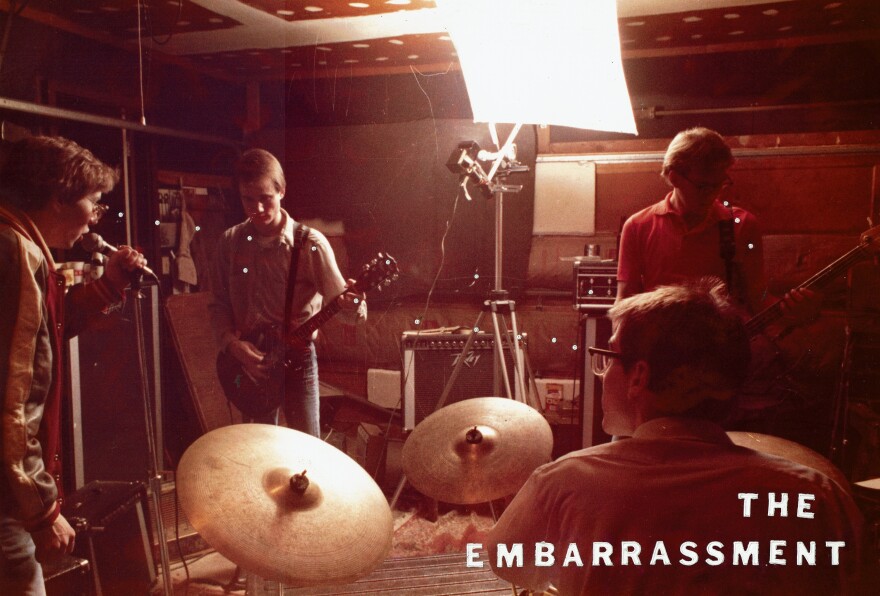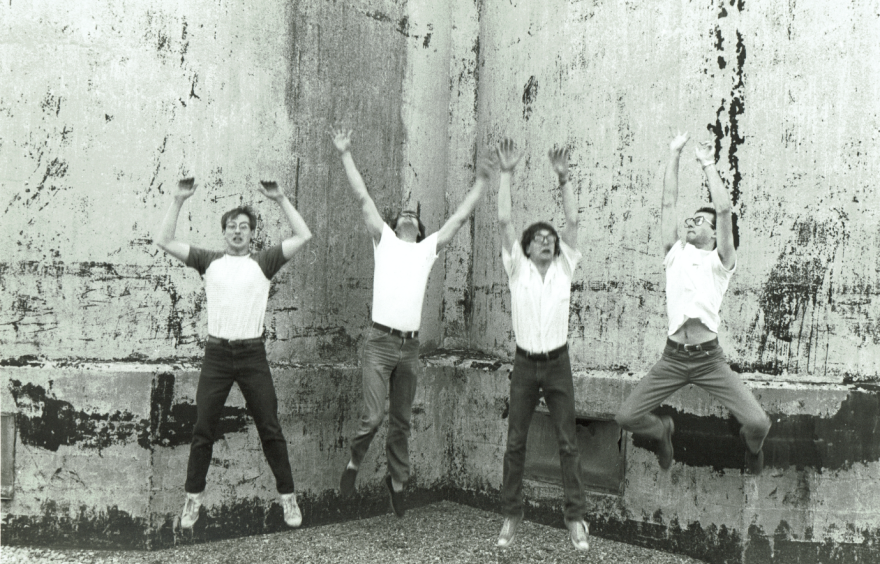"We Were Famous: You Don't Remember" is a new feature film from directors Dan Fetherston and Danny Szlauderbach. The picture makes its world premiere Friday night as part of the Tallgrass Film Festival.
The famous people in question are members of Wichita's seminal punk — or is it post-punk? — band The Embarrassment. Formed by four art students at Wichita State University, the group issued its own single, "Sex Drive," as the 1970s were coming to a close.

With parts cribbed from "Jesus Christ Superstar" and the blistering, Who-ish rhythm section of drummer Brent "Woody" Giessmann and bassist Ron Klaus, the track's anthemic qualities are instantly memorable, as is guitarist Bill Goffrier's blistering guitar work. If he wasn't invested in being a guitar hero along the lines of Jimi Hendrix or Edward Van Halen, he managed to carve his own niche as a player who could transcend both expectations and the instrument.
And all of that's before we hear John Nichols' inimitable vocals on a tune that, ultimately, is about a guy in a car cruising the streets of his hometown.
The Embarrassment flirted with success outside of Wichita, attracting attention in cities such as Minneapolis and Boston and finding a second home in Lawrence, but never bursting on the national scene the way the quartet deserved.
When the band came to an end in 1983, Goffrier and Geissmann scattered to Boston. The drummer landed a gig with Beantown's The Del Fuegos, who were poised to be a sensation in their own right, and Goffrier busied himself with Big Dipper and built a career as a painter.

Klaus and Nichols stayed, at least for a time in Wichita, before taking to pursuits outside music.
There have been various reunions in the decade's since the band's demise, though fans have mostly clung to copies of the compilation "Heyday: 1979-83," which captures the band in all its early, blister pop glory.
(A 1990 album, "God Help Us All," shows that the band lost none of its shine during an extended hiatus from recording and performing, though the LP underperformed upon its release.)
The group will perform Friday evening after a screening of "We Were Famous: You Don't Remember," outside the Orpheum Theatre with Goffrier, Nichols, and Geissmann joined by Tom Brewitt, who played in Big Dipper, on bass. (Klaus is unable to attend.)
Fetherston — who initiated the project nearly 20 years ago — and Szlauderbach recently spoke with KMUW about the enduring legacy of The Embarrassment.
This actually started way back with you, Dan, and I was curious about your interest in The Embarrassment because this was a band that broke up in 1983 and was really a regional phenomenon. How did the music spread to you on the East Coast?
Dan Fetherston: It was that time after college where I was exploring bands from 20 years before. We talk about the 20-year cycle of pop culture. In the early '80s those guys [The Embarrassment] were looking at the '60s. When I was graduating college in 2001, the post-punk stuff of the late '70s was really trending — the British stuff, Factory Records, Joy Division, Gang of Four, The Pop Group.

That was the first time the internet had kind of caught up [with the music]. You could illegally download anything you read about. It was this moment where there were all these amazing CDs that were coming out that were lovingly compiled. You get it all for free. I was exploring with a friend of mine and I wound up getting [The Embarrassment] compilation "Heyday" from my friend because I'd read about the band.
I just fell in love with this band that [sounded like it was from the] British [post-punk] era. They were referencing the same things. But it was distinctly American.
Danny, when did you come into the mix?
I came in 2016 when I first called Dan Rouser, the band's manager. I started my own thing but I found out on that very first phone call that [Dan] had started something years before. I had no idea. I called Rouser and said basically that this seemed like a documentary that was just waiting to be made. But, weirdly, that Dan [Fetherston] had started working on it wasn't disappointing to me because it confirmed the importance of the whole endeavor. The fact that he wasn't even from Kansas sort of added to it. But I didn't want to interfere.
I decided to start shooting my own interviews and doing my own research, and I did that for about two years before I realized that joining forces might be beneficial to both of us. So we had our first phone call in Summer 2019.
I want to talk about some footage that appears in the film from the Flat Iron building in Nomar. This was shot when the band was first together, and I wondered how many bands had the foresight to have a video camera around back then. There are a lot of bands from that era where there's no — or virtually — no footage.

DF: When I first started this project there was basically no YouTube. I think the first time I saw YouTube was in November 2005. I did that greedily. I wanted to see footage of The Embarrassment because I had to see them in action because I could only hear this crazy music.
There were these mysterious photos of them and I was thinking, "How did these nerdy guys play this? This raw, propulsive music." I'm a drummer, and I would listen to the drums and wonder how Brent did that. I needed to see it.
Eventually I found Jim Rosencutter, who was a really good archivist. It turned out that the band did have a small amount of footage from a Flat Iron show. I think Jim digitized it in 2006, and he sent me that around the same time.
DS: It really stands out as something that sets the band apart in the era. I really wanted to use it as the anchor [of the film] because it has multiple angles. It's really intimate, up close. The whole DIY thing was Dan Rouser's influence: Figuring out how to make it in the industry despite not living in New York or anything.
There was this promotional service called Rock America that would send flyers out to bands and they would promote these bands from across the country on this TV program. So the band hired a videographer from Chicago named Scott Jacobs, and he came and did this just as a test run for them. I think this was the same thing with their music videos — with a local TV guy from Wichita — they were really taking the lead. Dan Rouser, in one of our interviews, talked about reading about MTV and how video was the next phase. They really did take the lead on getting these music videos and getting the Flat Iron footage and using it to self-promote.

I wanted to touch briefly on something in the film that I didn't know. I thought I knew The Embarrassment story and then I found out that there was this connection with [film director] Jonathan Demme ["Silence of the Lambs," "Manchurian Candidate"] basically going around to labels saying, "Sign this band!"
DS: It's such a cool connection. As you'll see in the film, we have a few clips of the way he uses music in movies, which he became known for. It's usually people dancing and performing live, celebrating music, and he just fits it perfectly into the movies somehow, whether it's a concert film like the Talking Heads' "Stop Making Sense" or The Feelies in "Something Wild."
Obviously, I can't speak for the guys in the band, but I'm guessing that when they broke up in 1983, they weren't thinking that, 40 years later, there would be this film about them. It seems like every couple of years, somehow history gets its claws into the band, gets its claws into the story. I feel like maybe that was some part of making the film as well, as though the story was saying, "No, you're not done with this; you have to tell it."
DF: It was just the project that wouldn't die. It's become my life's embarrassment that I had abandoned it. I never thought I was someone who didn't complete things, didn't finish things. But just by sheer will and people wanting to know the story, here it is. We had no choice but to finish.
DS: I think that's one reason that we managed to finish this. There was this feeling that no one else could really understand — starting something and then knowing that it's not getting anywhere, that it's not getting finished. Being able to help each other cross the finish line was really big for us.


